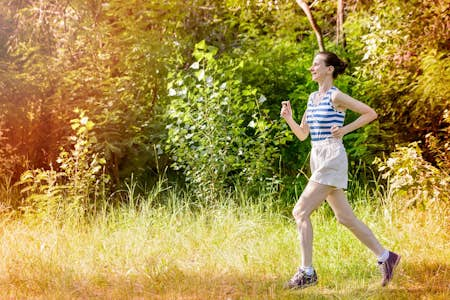Want to live a longer life and be healthier while doing so? Do just that with these fantastic longevity tips!
Get going
If you don't exercise, then now is the time to start. Exercise is an essential element of healthy ageing and is proven to prevent certain health conditions like Type 2 diabetes and heart disease. Physical activity doesn't have to be boring or lonely; it can be fun and sociable.
Good exercise for older people includes brisk walking – that can be taking the dog to the park – or playing a round of golf. In addition, fitness classes, dance sessions or team sports like badminton and tennis are a great way to bump up your heart rate and meet new people.
Exercise should also include higher impact activities, either 150 minutes of moderately intense activity or 75 minutes of vigorous exercise per week, according to the NHS guidelines for older adults.
The wise mantra of 'use it or lose it' applies to the human body as we age. You don't have to run the New York marathon only if you want to! Exercise significantly impacts mental wellbeing, increasing serotonin levels and lifting mood.
We spoke to Julie Robinson from Move It or Lose It, who told Health Times: "If you’re stuck for time, the simple sit to stand is one of the most important exercises we can do. It’s easy to do, it only takes 30 seconds and all you need is a chair and a stopwatch or clock. Here’s why you should make it part of your daily routine.
"From the age of 50, we lose about 1% of our muscle mass every year which can really affect our ability to stay active and independent.
"Getting up and down from your chair is a form of resistance training which you can do every day in the comfort of your own home. In fact, for 65 – 80 year olds, the sit to stand exercise has been shown to be as effective as going to the gym to improve leg strength. It’s also particularly helpful for those who can’t get out to take a brisk walk each day, or for those who live in homes without stairs to climb.
"To do the sit to stand:
- Put a strong upright chair with its back to the wall so the chair will not move
- Sit up tall, towards the front of the chair with your feet hip-width apart
- Pull your feet back a little closer to the chair so they are lined up under your knees
- Push into your heels and lift up out of the chair and then sit down again with control
- Take note of how many you can do in 30 seconds and aim to improve your score by 25%"
Check out your diet
A good diet is an essential element of healthy ageing for most of us. Eating well will make you feel good and reduce the interventions required and the prevalence of disease as you grow older. Remember, you are what you eat.
A good diet should contain plenty of variants and doesn't have to be boring. According to gerontology experts, old age changes metabolic processes in the human body, so what was appropriate for your physical needs a few years ago may not be the best menu now.
Adjusting your diet to reflect older age and understanding the best foods to eat helps you manage old age, reduce the risk of cardiovascular disease and increase not only your lifespan but your "health span," the period you live in good health.
It's all pretty straightforward stuff, and lots of information is available to help you. Try and minimise takeaways and eating out. If you do, choose the healthy option. Cut out sugar and carbs, and ensure you get your five-a-day.
If you need to lose some serious weight, then take dietary advice.
Reduce alcohol consumption and quit smoking
Of all the things you can do to promote lifespan and a healthy life, quitting smoking and keeping alcohol to a minimum are the most influential. For example, your risk of cardiovascular disease significantly decreases if you quit smoking.
The NHS is very invested in reducing the number of smokers in the UK, and there is a lot of help available if you want to give up. It's never too late.
Look after your mental health
The focus as we age is often on physical health, but mental and emotional wellbeing can prove a real challenge for older people, too. Horizons seem to diminish, and enthusiasm wanes. The once so key drivers like bringing up children or paying the mortgage may no longer be there. A gradual and creeping feeling of hopelessness seeps in as children grow up and retirement looms, a relief for some people but not for all.
As we age, we can naturally lose confidence, too. Old age can seem a time populated with worries about adult children, health concerns and money.
Healthy ageing offers a period of freedom where you can start to prioritise things that you want to do. It allows you to reevaluate your priorities. So why not begin to tackle that bucket list which you have put off for so long.
Life is a journey, and it is harder to see the staging posts as we age. So set goals and targets. They don't have to be earth-shattering; they can be modest but significant to you.
Emotional wellbeing in old age often plays second fiddle to physical health, which might deteriorate and get most of your attention. Also, poor physical health won't make you feel great about life.
Look after your mind. A good diet and regular exercise will help; also, try to dedicate some time to mindfulness or meditation.
The brain is a muscle, and regularly using it brings many benefits, whether you enjoy doing a challenging crossword or the daily Wordle.
So what is the definition of longevity?
Longevity is about how long we live, but almost no one wants exceptional longevity unless they can also enjoy healthy ageing. So for most people, it comes down to the quality of life over quantity.
Old age is not something anybody looks forward to, but leading a healthy life reduces the amount of medical and healthcare interventions we may need. In reality, most of us don't want to become supercentenarians. We just want to age well and enjoy a healthy life unrestricted by illness or disease. A healthy old age is an excellent opportunity to enjoy some of the freedoms you won’t have had since you were very young, plus you have the wisdom and life experience to really make the most of it.









